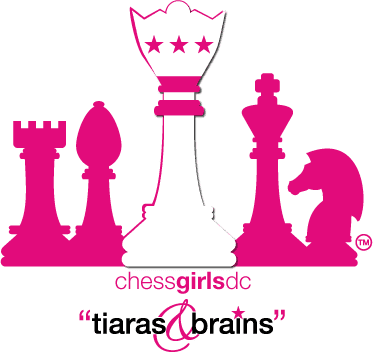|
Recently, A Woman’s Bridge interviewed Executive Director and Founder Robin Floyd-Ramson about her organization, Chess Girls DC.
Started as an initiative to build the confidence of young girls by creating an inclusive space for girls to learn and play chess, Chess Girls DC plays a vital role in closing the gender gap, one chess game at a time. Since its original founding in 2013, the organization has grown and sponsored tournaments, field trips, and speaking events to help young girls develop fundamental leadership skills, analytical and strategic thinking, and risk taking. The same skills taught through chess, the organization argues, also help girls take on professions in leadership roles, STEM careers, and more. What was the inspiration for Chess Girls DC? I founded the organization because girls could use chess to build confidence. I came to this realization when I saw my daughter playing at 5 years old. I also noticed there might be 100 boys at a co-ed tournament, and maybe 20 girls at a girls-only contest. My daughter really liked chess, and I found that girls don’t usually stay involved in activities unless their friends are involved. What impact have you seen on the girls in your program? I think what I see is the confidence. We have dynamic speakers in our chess club, dynamic lectures, and they return to school with more confidence. I see more confidence when they play. Recently, four of our girls crossed over to become high level players. These communities of high level players have few African Americans. When [our girls] play with others, I see they realize that they are intellectually equal to the other boys and everyone else there. Girls are self-conscious, I think boys are more self-confident but that’s only because they spend more time in activities that build up their confidence and risk taking. What is your hope for the growth of girls and women in traditionally male dominated STEM fields? I think that when you look at the root of most of these small programs, I think the take away is confidence and focus. When we think of the first year of college, some are more prepared with time management skills and confidence. We know from studies that men are more likely to go into an interview with a high level of confidence that helps them get the job, even if they are not as qualified. We need to instill this confidence early by showing girls that they can do it. In my personal life, I had a great chemistry teacher. I was bad at math, but this teacher always made me feel good and slowly built up my confidence. There was nothing that stood in my way and I eventually got into radiation therapy and became an entrepreneur. We don’t see many chess programs for girls because of marginalization, the little effort made to appeal to young girls to the game, and the social questions of why girls aren’t given an incentive or desire for these activities. The chessboards we play on are standard regulation, just turned pink and colorful. I am trying to coordinate a city-wide tournament for girls. I’m attaching a scholarship to the winner of each level, and that has never been done before. If we can hold that college incentive carrot, it will encourage more parents and the city to have more chess programs. Girls should learn early on the advantages of risk taking to get a high-powered job. Is there anything else you would like to mention? Robin: Chess players have the same skill and great leaders. We invite guest speakers in leadership roles to speak with our girls. This year we had the highest-ranking female chess-player speak. We also had the president of Pepco, Donna Copper, talk about how she designed a life plan because she always knew she wanted to run a company. Our speakers talk about having the confidence to do their job, how to work with men, how not to be distracted, and other skills. Not all the girls will be chess masters, [but they can use the skills they learn for other roles]. Something like a chess club should be multifaceted. We celebrated the day of the girl and learned about barriers to girls’ success. Kids find confidence with games. When that male-dominance gets to them, they can realize these are the things great leaders do. All the school programs are trying to tie things to STEM, but I feel like we forget about the artistic and the creative aspect. A lot of people who are artists also benefit from chess because it is cognitive development. Past speakers include Aprille Ericsson, the first African-American woman to earn a Ph.D in Mechanical Engineering at the NASA Goddard Space Flight Center, Admiral Michelle Howard, and chess champions Nazi Paikidze, Phiona Metusi, and Irine Kharisma Sukandar. Since Chess Girls DC’s founding in 2013, the organization has grown from working with 5 families to 35. Activities that the organization offers includes, etching girls how to play chess, how to participate in tournaments, how to read and write chess notation, chess theory, and to learn about chess scholarships. To find out more information about the DC Chess Girls, please visit their website. By Jessica Flores
1 Comment
|
Archives
June 2017
Categories
All
|

 RSS Feed
RSS Feed